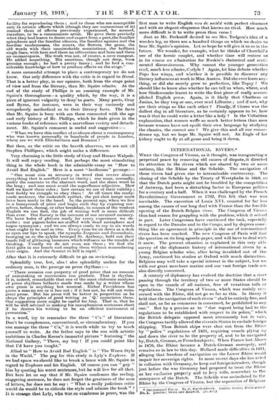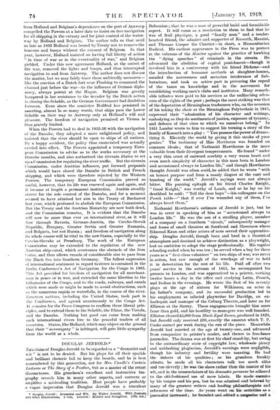INTERNATIONAL RIVERS.*
WREN the Congress of Vienna, as it thought, was inaugurating a perpetual peace by removing old causes of dispute, it directed its attention to the rivers which are shared by two or more nations, like the Rhine and the Schelde. The navigation of these rivers had given rise to interminable controversy. The closing of the Schelde by the Treaty of Westphalia in 1648, so that the Dutch ports might not be troubled by the competition of Antwerp, had been a disturbing factor in European politics for a century and a half. When it was challenged by the French Revolutionary Government in 1792, Pitt felt that war was inevitable. The execution of Louis XVI. counted for far Ices among the causes of our long duel with France than the forcible opening of the Dutch-Belgian river. The Congress of Vienna thus had reason for grappling with the problem, which it solved in part. Later Congresses have continued the task, especially in regard to the Danube and to the Congo, and by degrees some- thing like an agreement in principle in the use of international rivers has been reached. The new Congress of Paris will find the question on its long agenda-paper, and will have to deal with it anew. The present situation is explained in this very able survey of the diplomatic history of international rivers by a young Belgian scholar who, after being invalided out of the Army, continued his studies at Oxford with much distinction. Belgians may well take a special interest in the subject, but we with our great merchant marine and our vast foreign trade aro also directly concerned.
A century of diplomacy has evolved the doctrine that a river passing through the territory of two or more States should be open to the vessels of all nations, free of vexatious tolls or regulations. The Congress of Vienna, which was mainly con- cerned with the Rhine, did not go so far as this. 1n theory it held that the navigation of such rivers " shall be entirely free, and shall not, as far as commerce is concerned, be prohibited to any one." But by a proviso as to " due regard being had to the regulations to be established with respect to its police," which the British delegate opposed most strenuously but in Tail:, the Congress tacitly allowed the riverain States to exclude foreign shipping. Thee British ships were shut out from the Rhine by " police " regulations of 1831, requiring vessels plying up and down the river to be the property of, and to be navigated by, Dutch, German, or French subjects. When France lost Allot,' in 1870, the Rhine became a Dutch-German monopoly, and remains so in law to this day. Holland made difficulties in 1831. alleging that freedom of navigation on the Lower Rhine would impair her sovereign rights. In more recent days she has acted in collusion with Germany, to keep out foreign intruders, though just before the war Germany had proposed to treat the Rhine as her exclusive property and to levy tolls, somewhat to the annoyance of the Dutch. The Schelde was assimilated to the Rhine by the Congress of Vienna, but the separation of Belgium • tut Riven. By O. Kocclevbeeelt. Grates society eufiaarlete lfe. Leeson SAM sad MaInfi. Its.Zet.1
from Holland and Belgium's dependence on the port of Antwerp compelled the Powers at a later date to insist on free navigation for all shipping in the estuary and for joint control of the water- way by Holland and Belgium. The author tells us that until as late as 1892 Holland was bound by Treaty not to remove the beacons and buoys without the consent of Belgium. In that year, however, Holland insisted on having full liberty of action " in time of war or in the eventuality of war," and Belgium yielded. Under this new agreement Holland, at the outset of the war, removed the lights and buoys, and thus interrupted navigation to and from Antwerp. The author does not discuss the matter, but we may fairly trace these unfriendly measures— like the erection of a Dutch fort near Flushing to command the channel just before the war—to the influence of German diplo- macy, always potent at the Hague. Belgium was greatly hampered in her resistance to the invader by the Dutch action in closing the Schelde, as the German Government had doubtless foreseen. Even since the armistice Holliffid has persisted in asserting, almost in so many words, that ships pass the Lower Schelde on their way to Antwerp only at Holland's will and pleasure. The freedom of navigation promised at Vienna is thus gravely limited.
When the Powers had to deal in 1855.58 with the navigation of the Danube, they adopted a more enlightened policy, and insisted that the river should be open to ships of all nations. By a happy accident, the policy thus enunciated was actually carried into effect. The Powers appointed a temporary Euro- pean Commission to advise as to the works necessary at the Danube mouths, and also authorized the riverain States to act up a Commiesion for regulating the river traffic. But the riverain Commission, tinder Austrian influence, put forward proposals which would have closed the Danube to British and French shipping, and which were therefore rejected by the Western Powers. The temporary European Commission proved so useful, however, that its life was renewed again and again, and it became at length a permanent institution. Austria steadily strove for the sole control of the Danube, and for a moment seemed to have attained her aim in the Treaty of Bucharest last year, which professed to abolish the European Commission. But the Treaty and the Austrian Monarchy are now both dead, and the Commission remains. It is evident that the Danube will now be more than ever an international river, as it will flow through Bavaria, German-Austria, the ezecho-Slovak Republic, Hungary, Greater Serbia and Greater Rumania, and Bulgaria, but not Russia ; and freedom of navigation along its whole course will be vital to the new States, especially to the reecho-Slovaks at Pressburg. The work of the European Commission may be extended to the regulation of the new Austrian ship-canal, which overcomes the obstacle of the Iron Gates, and thus allows vessels of considerable size to pass from the Black Sea into Southern Germany. The fullest expression of international sentiment in regard to rivers is contained in the Berlin Conference's Act of Navigation for the Congo in 1885. This Act provided for freedom of navigation for all merchant- men in peace or in war, and extended the same liberties to the tributaries of the Congo, and to the roads, railways, and canals which were made or might be made to avoid obstructions, such as the numerous rapids or waterfalls, in the course of the river. Fourteen nations, including the United States, took part in the Conference, and agreed unanimously to the Congo Act. It n mains for the Peace Congress to reaffirm these liberal prin- ciples, and to extend them to the Schelde, the Rhine, the Vistula, and the Danube. Nothing but good can come from making such international rivers free to the peaceful traders of all countries. States, like Holland, which may object on the ground that their " sovereignty " is infringed, will gain little sympathy from the world as a whole.



































 Previous page
Previous page